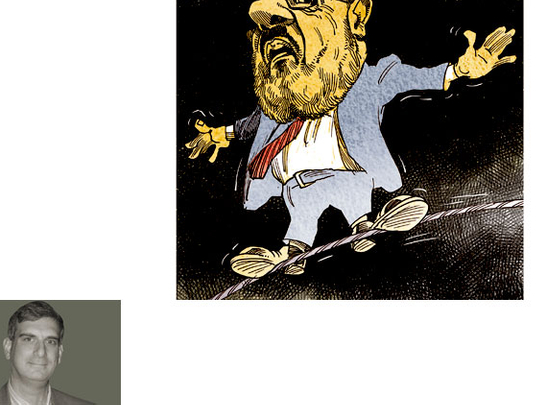
The most generous thing one can say about Mohammad Mursi’s power grab is that the Egyptian president might actually believe in what he says — that granting himself almost complete control of the country’s government is a temporary necessity in the name of securing a democratic future.
Even with that benign spin, however, the protests that broke out following Mursi’s announcement should have surprised no one. In the 22 months since Hosni Mubarak’s ouster, Mursi’s Muslim Brotherhood has broken promises regarding its participation in parliamentary and presidential elections and its approach to the constitutional assembly whenever doing so appeared to offer political advantage.
So Mursi may be sincere when he promises that his near-absolute authority will be both cautiously-applied and short-lived, but anyone outside the Brotherhood who doubts that is only being prudent. History is filled with examples of autocrats who began by promising democracy and ended up rationalising their own permanent hold on power.
Coming at the end of a week, during which Mursi played a key role in negotiating a ceasefire between Israel and Hamas, the move caught many outside observers by surprise. In retrospect, however, the timing makes a certain amount of sense.
Mursi’s power grab came only hours after the US Secretary of State, Hillary Clinton, had stood beside Egypt’s foreign minister in Cairo to announce the Gaza ceasefire. When the State Department responded to Mursi’s domestic moves with only a tepid statement of concern, some observers immediately drew a line connecting the two events. A muted American reaction, so the theory goes, was the price Mursi extracted from Washington for his assistance in Gaza.
There are three problems with this theory, though.
First, a quid-pro-quo would mean that Mursi was, in effect, seeking permission from Washington — something neither he nor any other Muslim Brotherhood leader would be likely to do. Moreover, what if the Americans had said ‘no’? Would Mursi really sabotage a Gaza ceasefire because he wanted American backing for a political power play at home?
The answer to that last question is ‘no’ because, and that brings us to the second point: Egypt’s interest in stopping the Hamas-Israel conflict was at least as great as Washington’s. From the moment the fighting began, the Egyptian leader was under tremendous pressure to demonstrate that he was doing something to help beleaguered Gazans. Coming to Hamas’ assistance militarily (and thereby starting a new war with Israel) was never on the cards. That left diplomacy, which offered Mursi both an opportunity to diffuse rising pro-Palestinian anger at home and a chance to reclaim Egypt’s central place on the region’s diplomatic stage.
Finally, looking at things from the opposite end, why would the Obama administration ever agree to such a trade-off? When word of the deal leaked out (as, sooner or later, it surely would) the cynicism involved in selling out what remains of the Arab Spring would destroy Barack Obama’s credibility throughout the region before his second term has even begun.
Having said all that, the fact that Washington probably had no role in facilitating Mursi’s domestic power grab does not mean that there is no connection between it and the ceasefire announcement.
Emerging triumphant from the first diplomatic crisis of his presidency, Mursi may have thought the time was ripe to strengthen his position at home. Reaction on the streets, from the judiciary and among rival politicians makes it now appear that he has overplayed his hand, but it is easy to see how he might have thought the timing was good.
Which brings us back to the original question: Is Mursi serious when he claims his absolute control of Egypt will be short-lived?
As Dictator (an actual title in his case) Cincinnatus sorted out ancient Rome’s civic life and then retired quietly to his farm, George Washington first rejected an opportunity to become king of the newly-independent United States and then voluntarily stepped aside after two terms as president — establishing a tradition that was unchallenged for 150 years. Other examples of such statesmanlike surrender of power are hard to find.
What Mursi does in the weeks and months to come will resonate beyond his own political future or that of his party. His actions are likely to set the tone of Egyptian politics for a generation or more. There is little in the history of Egypt, the wider Middle East or the Muslim Brotherhood to suggest that Mursi will rise to this challenge — hence his opponents’ rage and the outside world’s mistrust.
It would be a great thing if Mursi could prove his critics wrong. Granted the historical precedents, however, until that happens, he does not deserve the benefit of the doubt.
Gordon Robison, a longtime Middle East journalist and US political analyst, teaches political science at the University of Vermont.









